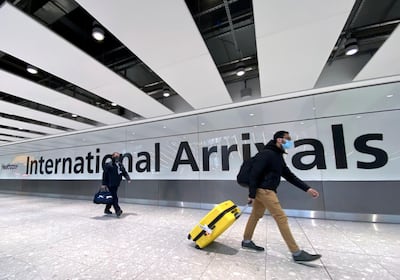Customs officials in the UK uncovered fake coronavirus test results at Heathrow Airport near London by checking the documents for misplaced letters and incorrect vowels.
All travellers who enter the UK must present a negative coronavirus test result taken within 72 hours of their departure.
However, there is no standard form, language or encryption technology for the certificates.
Lucy Moreton, from the Immigration Services Union, said customs officials were catching a "reasonable number" of fakes each day.
"Normally, the way this type of counterfeit is spotted is an obvious spelling error," she said.
Fraudulent test results have also been found at airports in Canada, France and Mexico.
"It is almost impossible to tell whether [a test] is fake or not, except by going through a lengthy and almost impossible verification process," said Vinoop Goel, a senior official at the International Air Transport Association (IATA).
Ms Moreton said making coronavirus -related record checks can add up to 20 minutes per traveller, raising doubts over Heathrow's ability to handle an anticipated surge in summer traffic.
Concerns over waiting times and public health risks posed by an trade in forged results are driving efforts to produce fraud-resistant coronavirus certificates that can be read easily across borders.
Discussions led by the UN's aviation agency in Montreal, Canada, mark the broadest attempt yet to convince governments to take action.
The International Civil Aviation Organisation (ICAO) is scheduled to review and may adopt guidance on Friday, a source familiar with the plans said.
At Heathrow, passengers recently posted social media accounts of hours-long waits over delays related to measures.
"Enough to make you never want to travel again," said passenger Camilla Tetley, who wrote on Twitter that she spent six hours in an immigration control line at the airport.
A Heathrow spokeswoman blamed the lines on insufficient staffing to meet government coronavirus requirements.
A government spokesman challenged that explanation.
"It is incorrect to say that Border Force are not providing adequate staffing numbers at Heathrow. We have maintained staffing levels at Heathrow throughout the pandemic," he said in an email.
Providing false documents is against the law, he added, stressing that "pre-departure testing is in place to protect the health of the UK public".
If a passenger arrives in England without proof of a negative test result, they could be fined £500 ($694.20) and the airline could be fined £2,000.
Apps from carriers including American Airlines, British Airways and United Airlines, as well as one for the IATA's new Travel Pass can hold health data, such as test results, on a phone.
But carriers need guidelines, especially in the US, where airlines are responsible for verifying passengers' test results before boarding.
On Monday, US airline travel and aerospace groups urged Washington to develop guidance on how to authenticate test results and protect passengers' privacy.
The US government could look to recommendations from ICAO, the agency that sets global standards on everything from runway markings to crash investigations.
The recommendations ICAO will consider, from the task force, would have countries weigh technologies that would ensure testing is secure, trustworthy and complies with data protection legislation, a source said.
One option under consideration involves a government-issued digital seal used on passports.
A lab would transmit data showing a negative test result to the government, which would provide an encrypted barcode securing a travel-ready document or digital product that can be scanned at the airport.
Discussions held by ICAO's task force echoed a broader debate over passenger privacy, since some technologies require health information to be transmitted digitally.
Using passport technology to secure lab tests also evoked fears that some countries may not have the resources to issue large volumes of secure passes with short shelf lives.
"Issuing passports is not the same scale as issuing test certificates," said a second source involved in the talks.
"A passport lasts for 10 years, while a [coronavirus] test lasts for three days."









